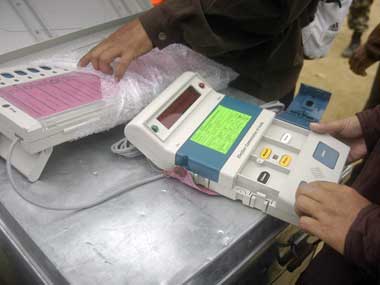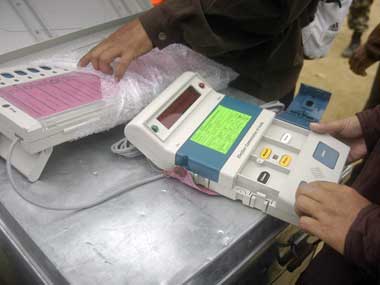Have political parties found a way to fool the Election Commission? There is good reason to think so since many of the Commission’s time-tested rules and norms for the conduct of the elections are now set in stone, and smart cookies are now beginning to game the system. This may not actually affect the final outcomes significantly, but everyone – political parties, the media and even voters - has now figured out how to fool the Election Commission. Worse, many of them may suspect that the Commission is a paper tiger, whose bark may be worse that its bite. The key elements of the Commission’s approach are now well understood: the nation always has multi-phase polling; there is a code of conduct that kicks in roughly a month or 35 days ahead of the first day of polling; all voting is done through electronic voting machines (EVMs); campaigning has to end 48 hours before polling date; etc.[caption id=“attachment_1495837” align=“alignleft” width=“380”]  Poll time. Reuters[/caption] But as the ongoing elections showed, the vulnerabilities of the system have been tested and taken advantage of. The BJP managed to produce its election manifesto on the first date of polling, 7 April. It got free publicity even though campaign rules mandate that once polling starts, there can be no campaigning. Today (24 April), even as the sixth phase of polling was on, Narendra Modi made a media event out of his filing of nomination papers in Varanasi. That’s an easy way to gain voter traction in the states that went to the polls even without violating the poll code. In the current general elections, opinion polls have been held after the first phase of polling. NDTV concluded one after polling began. The Election Commission only forbids the publishing of exit polls, but who can monitor whether the survey was done pre-poll or exit? Parties are managing to make strategic leaks on internal or doctored opinion/exit polls in the early phases of polling – which may have their impact on voting trends in the later phases. Parties have learnt to inundate an overloaded Election Commission with so many code of conduct violations that effectively most violations cannot be acted upon. Politicians have also tested the limits of the Commission’s tolerance. A mea culpa from Amit Shah was enough to let the Commission pardon his “badla” remark. Parties have also learnt to intimidate the Election Commission while claiming to respect it. Trinamool chief Mamata Banerjee raised a shindig about the transfer orders issued to some officials in West Bengal, but even while complying, she sent a tough message to the Commission: don’t mess with me. So did Samajwadi strongman Azam Kham, who refused to apologise for his communal statements on Kargil, thus forcing the Commission to look unbalanced vis-à-vis Amit Shah. Once parties make a strong issue, the Commission can well feel intimidated by it. Many voters also get to vote twice, thanks to the gaps in the system. I have been told of one person who voted in his village which had its election in the early phases, and then returned to Mumbai to vote again today. This is possible only because of multi-phase polling, where it is possible to let the black ink-mark fade in two weeks – or even get it removed – and vote twice. Maybe, Sharad Pawar’s advice to supporters to vote twice was not a joke after all. There is no foolproof way of ensuring EVMs are not tampered with. Though no one suspects major hanky-panky as of now, one needs safeguards that can be publicly monitored without compromising the process. So what are the remedies? First, multi-phase polling cannot be taken to extremes – like this time. The country should use all its police forces and administrative personnel to ensure that polling is completed in two or maximum three phases. Nine phases is simply too long to wait for a verdict, and for governments to sit in limbo. Second, no state should have multi-phase polling. One wonders why Uttar Pradesh and Bihar need to have six-phases of polling for districts that are just a bus-ride away. Every state should poll only on one day even if we have three-phase polling for the whole country. If it can be done for Tamil Nadu, Kerala, Karnataka and Gujarat (all completed in one day), one wonders why other states need multi-phase polling, where leaked trends (even doctored information) from one phase can be used to influence the voter in the next phase. Reducing the number of phases will also reduce chances of the same person voting twice – once in his urban place of work, and again in his rural home. Third, the Commission needs to restrict frivolous complaints regarding the code of conduct and focus instead on attempts to bribe or intimidate voters and extreme hate speech. Amit Shah’s “badla” remark, Sonia Gandhi’s “khoon ki kheti” or Modi’s references to Shehzada are, in my opinion, are all borderline cases. Any close election will invite strong language from politicians, and the Commission should really be concentrating on the big abuses – and not just innuendo and name-calling. Right now, the Commission gets inundated with all kinds of pointless complaints. In Tamil Nadu, for example, the Commission had received 55,000 complaints on the misuse of public and private properties for putting up election messages and posters. Obviously, this is a serious problem for the owners of these defaced properties, but they have little to do with the conduct of the elections. Can the Commission really act on 55,000 complaints with its kind of skimpy staffing? Defacement of public property should be left to the state administration or the courts to deal with. Fourth, a more foolproof system of updating and deleting names from electoral rolls needs to be introduced, especially in urban areas, where people change addresses frequently and tend to get enrolled either multiple times, or get deleted because they have moved elsewhere. Some form of digital registration based on PAN numbers, Aadhaar numbers or any unique ID-based system should used to enable voters to update their addresses electronically – with automatic deletions of previous enrolments. Fifth, at some point EVMs need to be replaced with foolproof digital voting – where votes are registered in polling booths with digital signatures or unique ID numbers. EVMs, once a huge innovation in our democracy, are now an anachronism in the digital age. Votes should now be cast digitally. This will also allow for remote voting – which could improve polling percentages of the urban middle class. Sixth, every party violates the spirit of the code of conduct by using government money to advertise schemes before polling dates are announced. A simple rule, which bans any government-financed advertising six months before an election, might help. In the run-up to the 5 March announcement of polling dates, the central and state governments spent crores in advertising the parties in power. The Election Commission usually gets high marks for its successful conduct of fairly peaceful polling in the world’s largest and most raucous democracy. With 814 million voters, huge regional and national diversities, difficult terrain, and an aggressive political class that is always testing the limits of tolerance, merely ensuring fair polling is a huge triumph. But its existing ways of working have become old hat and all parties have now learnt to work their way around it. Time to change the rules.
The Election Commission’s rules are now being gamed by all political parties. It is time to change the rules and make them more foolproof.
Advertisement
End of Article
Written by R Jagannathan
R Jagannathan is the Editor-in-Chief of Firstpost. see more


)
)
)
)
)
)
)
)
)



